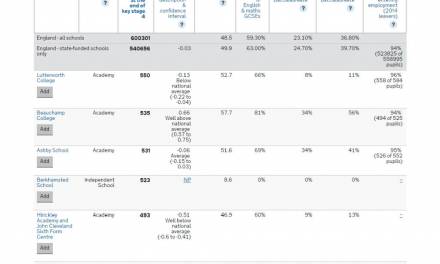League tables could be said to be a snapshot of the quality of a school; a grade which represents every lesson, each extra pastoral support meeting and the blood, sweat and tears of every teacher and pupil within a school over the past 12 months.
But can league tables could ever represent all of these elements? This question has been at the heart of a 2017 revolution in how the league tables are calculated. Let’s look at the before, the after and the impact of both.
League tables pre-2017: The bad old days?
I am a league table sceptic. At best, league table ratings offer a snapshot of academic performance; at worst they mislead parents, especially as they do not report or represent the full range of exams that some schools offer.
The way in which schools are ranked in league tables has long since been a matter of heated debate – a fly in the ointment that served as a sticking point between politicians and ‘boots on the ground’ school staff.
Before 2017, the position of a school was based purely on the proportion of pupils achieving five GCSE grades at A* – C, including English and maths.
This limited approach brought about many issues: the first of which was that certain schools with a broad curriculum incorporating alternative courses were represented as failures if judged solely on their position in the league table.
Epitomising this issue is Rugby School and Eton College – two of the most prestigious educational institutions in the UK, and two institutions that also scored 0 for the academic year of 2015. So, how could this have happened?
Peter Green, writing for the Telegraph, explained that he categorically disagreed with league tables and that their focus on a broad range of subjects beyond English, maths and science, resulted in the institution technically scoring 0.
All change: The switch from GCSE grades to ‘Progress 8’
Now, change has come – the introduction of ‘Progress 8’, a fresh structure for judging attainment and school performance, is created from four elements (so-called ‘buckets’):
– English – double weighted – best of English Language or Literature
– Maths – double weighted
– EBacc3 – three highest point scores from any of the EBacc qualifications in science subjects, computer science, history, geography, and languages.
– Other3 / Open3 – the three highest point scores in any three other subjects.
Progress 8 weighs up pupil progression – taking into consideration the academic starting point of pupils, and their attainment at the end of their school journey. This is represented by a number that ranges between -1 and 1, which links to one of five ‘bands’:
– Well above average
– Above average
– Average
– Below average
– Well below average
This will directly address two issues that have been said to relate to ‘borderline’ pupils:
1. Previously borderline pupils may have either been dissuaded from taking certain subjects or;
2. Focus would have been unfairly placed on the borderline pupils taking the core GCSEs in order to improve their exam results and prevent them from adversely impacting the school’s league table position.
Parents believe that league tables are the best way to judge a school’s success (don’t they?)
Whilst much work has been done to finally tackle league table problems, a recent study undertakes by NASUWT revealed something few could have predicted: less than a third of parents refer to league tables when selecting potential schools for their children (BBC). Instead parents focus on:
- Seeking out general information (54%)
- Reading the latest OFSTED report (53%)
- Speaking to fellow parents whose children already attend the given school (53%)
Punitive ranking of schools in performance league tables is not something on which most parents rely, and therefore schools, parents and children are subjected to this negative annual ritual unnecessarily.
So, in answer to our question as to what school league tables really mean, the answer it seems (for most parents at least) is very little.
For many teachers, however, league tables mean much more today (after the introduction of Progress 8), as they should for most pupils. Whilst Progress 8 is in its first fledgling stages, there’s no doubt that it’s a step in the right direction – bringing more meaning to those much-contested league tables.
What’s your experience of league tables? Is your performance measured in some way by how well your school performs in league tables? Or are league tables just a distraction?









